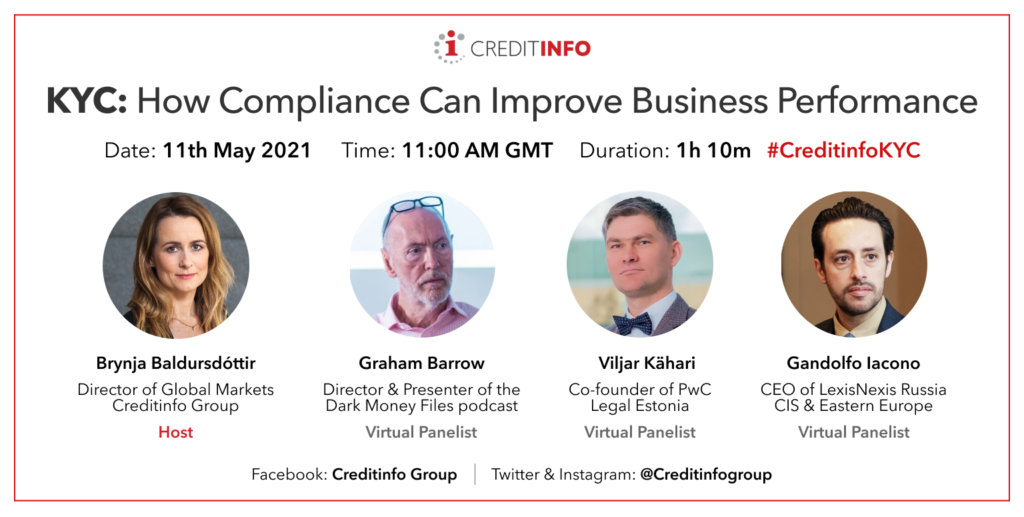Creditinfo Launches New Global Fraud & ID Solution

Creditinfo’s new solution supports clients in mitigating the impact of fraud and supporting organisational growth.
London – 27th March 2025: Creditinfo, a global service provider for credit information and risk management solutions, has today announced the launch of its global identity, know your customer (KYC), and fraud and ID solution, set to help organisations tackle financial crime.
The overall global economic impact of financial crime has been estimated to be $5 trillion. What’s more, according to the 2024 Nasdaq global financial crime report, fraud losses totalled $485.6 billion worldwide, from fraud scams and bank fraud schemes alone. As such, organisations face a series of challenges, from eroding profit margins to reputational risks to data breaches. Creditinfo’s solution helps organisations to address these challenges by using credit bureau data, government information services, and other registries to establish trust in presented identities, without negatively impacting the customer experience.
The solution integrates identity proofing, digital risk signals and comprehensive international and domestic watchlists to deliver strong KYC compliance and reduce the risk of fraudulent activity. It also enables businesses to streamline risk management and ensures they meet stringent customer due diligence requirements under anti-money laundering (AML) regulations.
As a global solution, it is tailored to meet the unique needs and maturity-levels of different markets. By accounting for these differences, organisations that use the solution can adapt their fraud prevention strategies to specific local risks, strengthening security and promoting financial inclusion.
Creditinfo has appointed Rob Meakin as Director of Fraud & Identity to head up this service. He brings extensive experience in fraud prevention, identity management, and financial services. Meakin will lead efforts to help organisations counter fraud – leveraging advanced technologies and data analytics to enhance the customer experience and strengthen fraud and AML controls.
Rob Meakin, Director of Fraud and Identity at Creditinfo, said: “The growing presence of organised financial crime is significantly hindering economic growth on both a local and global scale, costing businesses huge sums of money each year – in fraud losses, lost sales and operational costs. That’s why, at Creditinfo, we’re pioneering a solution that provides a way for organisations to manage risk and maintain compliance while facilitating secure and easy access to financial products and services for consumers.”
John Cannon, Chief Commercial Officer at Creditinfo said: “By removing friction from both traditional and digital onboarding and origination processes, our solution helps organisations reduce fraud, improve conversion rates, and drive top-line growth while ensuring a seamless customer journey. As we strive to expand our global reach and enhance financial access for millions of consumers and businesses worldwide, having Rob join our team is an invaluable advantage, strengthening both our security capabilities and our ability to deliver innovative solutions.”
-END-
About Creditinfo
Established in 1997 and headquartered in London, UK, Creditinfo is a provider of credit information and risk management solutions worldwide. As one of the fastest-growing companies in its field, Creditinfo facilitates access to finance, through intelligent information, software and decision analytics solutions.
With more than 30 credit bureaus running today, Creditinfo has the most considerable global presence in this field of credit risk management, with a significantly greater footprint than competitors. For decades it has provided business information, risk management and credit bureau solutions to some of the largest, lenders, governments and central banks globally to increase financial inclusion and generate economic growth by allowing credit access for SMEs and individuals.
For more information, please visit www.creditinfo.com
For inquiries email rob.meakin@creditinfo.com
Download Brochure HereCreditinfo Estonia’s sanctions’ monitoring solution for small businesses

With the ongoing aggression initiated by the Russian Federation in Ukraine, the need to implement international sanctions has to be embedded in the daily business activities of our companies.
We know that companies – operating in the fields of activity subject to such a special obligation – must do more due diligence to mitigate the risks associated with implementing sanctions, but the processes should be somewhat similar to all of the companies operating in Estonia.
Such companies, whose daily economic activities do not deal with continuous customer background research or transaction monitoring, can sometimes be in a difficult situation where they do not have enough know-how or manpower resources to assess the risk of whether one of their customers or partners falls under the established restrictions or not.
Finding such a necessary workforce is always possible, but as you know, making such a fixed cost can sometimes be impossible according to the company’s business model. In this case, one of the options is to delegate the control of said risks outside the company or to use convenient and straightforward, but at the same time reliable services to help with this task, which are available on the market.
For these cases, Creditinfo is offering small businesses the opportunity to mitigate their risks in two ways – by delegating the checking of compliance with sanction lists for their customers and partners entirely to us or by using a straightforward and convenient solution on our e-Krediidiinfo portal – WebScreening.
The web-based service WebScreening allows you to request the entry of a person of interest to you through a convenient and comprehensive user interface, both on international sanctions (European Union and the United Nations) and watch lists (so-called local sanctions and “black lists” of various countries, in some instances, for example, wanted persons) as well as persons with a national background ( PEP) from the lists.
With additional functions, it is possible to perform user management in the portal (if the company has more than one user) or view the archive of requests made. At this point, it is good to note that the archive of performed requests is convenient to use, for example, to check the performance of the employee’s duties and prove the requests made to the supervisory authority, if necessary.
Check out the service: www.creditinfo.ee/kyc
An excellent Account Information Service is based on the accuracy of the categorization of transactions

In 2021, Creditinfo Estonia received permission from the Financial Supervision Authority to start offering account information services in Estonia, which later expanded to the markets of Latvia and Lithuania. Today, we have been offering the account information service on the market for almost two years. The account information service is based on the PSD2 directive. We have access to the transaction data of customers of banks and financial institutions using a secure data transmission channel and customer consent.
Account information categorization is the first and most trivial account data processing that creates customer value. In addition to the primary value, categorization is also an input for all subsequent, significantly more value-creating services (for example, debt risk assessment). Without categorization, each time finding, analyzing and displaying value from account information becomes too resource-intensive, so the end user would have to wait a relatively long time to get a result from their data.
Unfortunately, categorization is worthless if the accuracy and quality of the categories are low. Of course, every transaction on a bank account is not an input for assessing a person’s credit risk. When determining credit risk, it is critically important that the accuracy of the categorization of transactions required for analysis is as high as possible. This is to prevent credit losses for companies and overdue debts for private individuals, directly affecting both interest groups’ reputations.
The main input from categorization is related to income
Visit creditinfo.ee/en for more information.
Ivo Vallau
Open Banking Product Manager, Ceditinfo Estonia.
Access to customer bank transaction data provides a basis for more intelligent business decisions

In 2021, Creditinfo Estonia received permission from the Financial Supervision Authority to start offering account information services in Estonia, which later expanded to the markets of Latvia and Lithuania. Today, they have been offering the account information service on the market for almost two years. The PSD2 directive regulates the account information service, that grants account information service provider (Creditinfo) access to the transaction data of end-customers of banks and financial institutions, using a secure data transmission channel and customer consent.
Intelligent business decisions can only be made when decision-makers have enough information when making the decision. Decisions made without comprehensive information may remain superficial or rely too much on intuition. A joint decision becomes smart by including relevant, up-to-date, appropriate and verified data for decision-making, analyzing it and drawing conclusions from it.
Companies that want to be competitive in the market and, at the same time, grow faster than the market must act consciously and operatively to take advantage of the exponentially increasing amount of data and to navigate the diverse data landscape. The word “action” means the application of well-thought-out multiple technologies, the careful selection of primary data and adaptation to large, innovative data sets that provide the company with necessary data inquiries and detail-specific analyses. The actions mentioned in the previous sentence are based on the data value chain – a framework for managing data from collection to decision-making.
Access to bank transaction data gives the financial sector and several other sectors an unlimited opportunity to use innovative data sets to improve their business processes. Data (including account data) collection, analysis, targeted use and data-driven decision-making directly relate to Creditinfo’s core business. Creditinfo has invested a lot of time and knowledge to ensure and support its customers in successfully using the account information data. Remember that the customer does not have to invest resources in implementing the necessary specific technologies and data analysis in addition to their core business to filter and acquire value from bank transaction data.
Creditinfo adds value to account data with information from other sources
Bank transaction data helps to make more intelligent and more informed decisions regarding the products, services and conditions offered to the end customer. Figuratively speaking, credit bureau data enlighten one corner of the room of a person’s financial behavior, and the information obtained from account transactions enlightens the other corner of the room of a person’s financial behaviour.
Account information, besides evaluating financial behavior, provides information about a person’s daily habits, experiences, preferences, hobbies and much more.
In summary, access to the data of the end customer’s bank transactions provides a foundation for making business decisions based on an even more extensive and significantly more diverse data set, in other words, making decisions even smarter. As a universal, comprehensive solution provider throughout the Baltics, Creditinfo is the only partner for its customers with access to credit bureau data, global KYC data, and bank account data.
Visit creditinfo.ee/en for more information.
Ivo Vallau
Open Banking Product Manager, Ceditinfo Estonia.
A Master’s Thesis that highlighted the importance of timely submission of the Annual Report

In May 2023, Creditinfo Eesti announced a prize fund to recognize students who have addressed research questions in the fields of money laundering and sanctions in their research. In cooperation with the COBALT law firm and the representatives of the State Money Laundering Bureau, the evaluation committee chose Victoria Helenurme, a master’s student from the University of Tartu, as the winner for her master’s thesis on the topic “Prediction of deletion from the business register due to non-submission of the annual financial report using the example of Estonian companies”.
Victoria Helenurm is from Tallinn and graduated cum laude from the University of Tartu, majoring in Marketing & Financial Management. Today, she works as a financial controller in a company offering energy-saving indoor climate and renewable energy solutions and sees her future in business.

We had an interview with her on the journey of her thesis topic:
The topic of your thesis was “Prediction of deletion from the business register due to non-submission of the annual financial report using the example of Estonian companies” – how did you arrive at this topic?
At the beginning of the summer of 2022, discussions began with people who eventually became my thesis supervisors. My main desire was to write a paper on a current topic in society. This year, the Estonian state penalties for not submitting the annual report became harsher, and in cooperation with my supervisors, we saw that there is a public interest in this area of research and also sufficient data for research.
Why was this topic worth researching?
If, as a person, we take a loan, for example, we are understanding the obligations that come with taking a loan. For me, founding a company or being on its board is a somewhat similar responsibility – as a manager, we have assumed the responsibility, among other things, to report on the progress of our company’s business to the public.
Unfortunately, while we are mostly exemplary in servicing loans, tens of thousands of Estonian companies fail to submit their annual reports on time.
I cannot say whether this difference is due to, among other things, the fact that the penalties for not submitting the annual report have been relatively lenient. But it is certainly worthwhile for us to become more aware that such behavior is problematic.
After all the state of our countries businesses is based largely according to the data of the Business Register. If we have thousands of active companies that do not fulfill their reporting obligations, the financial forecasts, risk analyses, business decisions, etc. of the state, lenders and other parties will suffer in its quality.
The submission deadline (6 months after the end of the financial year) is a very lenient deadline. The business landscape is more and more unpredictable, so the knowledge of the previous year’s business results that arrives half a year later is already outdated. As is typical of our e-government, we would expect that at least certain types of companies could be assigned a much earlier submission obligation to help update our economic data.
What facts became clearer as part of the research?
In my research, I tried to find an answer to the question of whether the deregistration of a company can be predicted purely by looking at how the company’s management has cared about the obligation to submit an annual report in its previous business life.
The Estonian financial world is very much a believer in financial ratios when assessing the business health of a company. I tried to see if it is possible to convincingly assess the business risk of deleting the company by completely setting aside the financial statement.
The studied dataset also proved this – a significantly more accurate forecasting method than financial ratios (prediction accuracy approx. 63%) was the observation of the past behavior of board members (prediction accuracy almost 82%). It can be said that if there is a member of the board of the company who has either delayed or failed to submit the financial year report in previous companies, it is a very clear business risk, which indicates the risk of deletion of the company in question.
How could this research topic be continued?
Although I myself rather do not plan to continue my studies in a doctoral program, I definitely see possibilities for expanding this research topic. The obtained research results could certainly be compared with our neighboring countries – to assess whether in Latvia, Lithuania, Finland, etc. there are similar relationships between corporate delisting and board members’ past due diligence.
Another immediate opportunity for investigation is provided by the amendments to the law that entered into force this year, which toughened the penalties for failure to submit an annual report, among other things. Repeating this research in 5+ years would give an idea of whether business behavior has improved in terms of reporting obligations.
We were very pleased with Victoria’s research, as her research clearly connected with the general theme of our competition – the data of the Business Register and national registers in general are the main factors when applying the KYC principle. Financial data from the company that is not submitted on time or is completely missing, is a clear danger signal when investigating the background of your business partner.
When it comes to risk management – both when creating a customer relationship and during the existence of a customer relationship, up-to-date data from the business register is very necessary. Does the company actually operate; whether the data there (especially the field of activity and financial data) are correct (especially when it comes to the application of enhanced due diligence measures). The given data helps to understand the customer’s activity profile.
If the client does not submit annual reports, it is clear that it may be a riskier client, and this should be taken into account when establishing or monitoring a business relationship in order to mitigate the risk.
Urmas Pai – KYC&Fraud Global Product Manager, Head of the evaluation committee
Creditinfo Estonia
Creditinfo’s Account Information Service Product

In the spring of 2021, the Estonian Financial Supervision Authority authorized Creditinfo Estonia to offer Account Information Service in the Estonian market. In the autumn of 2021, the Estonian Financial Supervision Authority also granted the authorization to provide Account Information Service to the Latvian and Lithuanian markets. This act added to our product portfolio a new, exciting product that benefits our customers in the short and long run. As of today, we have had the Account Information Service in our cross-Baltic product portfolio for two years.
About the Account Information Service
The opportunity to provide Account Information Service emerged when the European Union (EU) Parliament and the EU Council adopted a new directive regulating payment services in the EU internal market on November 25, 2015 (PSD2), which emphasized the expansion of open banking in Europe.
Open Banking refers to provide third-party financial service providers open access to transactional data of bank and financial institution customers, using secure data transmission channels and customer consent.
The Account Information Service is a part of the Open Banking initiative, defined as an online service where the service user (customer) is identified and authenticated via strong identification and authentification means. The service itself means transmitting customer’s bank account data through a secure channel to third party from whom the customer wishes to apply a credit product.
How does Creditinfo provide the Account Information Service?
Using Creditinfo Estonia’s solution, both individuals, which is regulated by the aforementioned payment service directive, and companies can transmit their account information to third parties.
Beside financial sector the possibilities of the Account Information Service can be successfully used in application processes in various sectors. Previously mentioned customer consent is obviously obligatory.
Different sectors that can benefit from account information:
- Public sector companies that provide subsidies to individuals and businesses, where the information in the account details creates significant value when determining subsidies;
- Insurance sector companies, which can use behavioral information from the bank account for determining insurance premiums or simplifying the insurance incident evidence burden;
- Other sectors where value from account information help to create better personalized offers for their products and services.
The strength of our Account Information Service is categorization.
The greatest value of the Account Information Service provided by Creditinfo Estonia comes from categorizing account transactions, which our clients (data recipients) can conveniently use in their business decisions.
Categorization is a solution that can and should be continuously improved over time. Precise and detailed categorization is a top priority for Creditinfo Estonia’s Account Information Service.
The data from the Account Information Service serves also as an input for our Account Information Service Report. The report helps to make more informed business decisions both internally and towards our client’s customers. The report highlights all the key ratios, indicators, “green and red flags” and much more that can be extracted from account information.
The report is designed in a way that can be customized to meet the client’s needs, which make it a tool for everyday business decisions.
More information about the service: https://creditinfo.ee/en/avoid-debts/psd2/
The Know Your Customer (KYC) world and Creditinfo’s role in it.

The acronym KYC stands for three very simple and understandable words – Know Your Customer. But the meaning of the processes and expectations behind those three letters are most often not so simple and straightforward, as whoever must deal with this today already well-known acronym, knows that the world and the industry behind this magical acronym, is already vast and growing every day.
KYC in very essence means that you must have understanding and information of the background of your customer. Often this information is divided into three basic categories:
- Identification of the persons connected or operating behalf the customer.
- The field of activity or daily business including the understanding of the origin of the customers funds.
- The understanding if customer possesses certain risks while having any business relationships with him.
Mainly this sort of detective work is required in the purpose of mitigation the risks in anti-money-laundering/fight against terrorism financing (AML/CTF) but it is also relevant in the process of imposing international sanctions as sanctioned persons are interested that their business interest would remain undiscovered.
Even companies that are not subject to AML regulation need to ensure that they stay out of trouble caused by risks that are risen because of partners or clients with fraudulent, criminal, or sanctioned background, as this may result with loss of revenues/funds, bad business reputation or fines by authorities.
So therefore, it is essential for market entities to trust their business affiliates and therefore they need to verify that everything is OK with their customers and threat of the damage caused by realization of different risks, is minimized.
What is happening in Europe to strike this conversation now?
One very practical side for knowing your customer is to be sure that you’re not violating any sanctioning regime in force. Sanctions and sanctioning regimes may not be familiar to all of us who we just are involved our day-to-day business, but this obligation is something we all must know and follow. International sanctions are seen as sort of political means for influencing certain group of entities, jurisdictions, or organizations to behave in line to accordance with the international human rights, rules of law and territorial integrity. Sanctions are imposed in a way that all private and legal entities are obliged to fulfill them, authorities who are imposing them are usually international organizations (EU, UN) or state governments.
As Russia launched massive war campaign in Ukraine in February 2022 and has performed several actions against Ukraine’s territorial integrity already from year 2014 this kind of behavior has naturally found a reflection from EU by imposing sanctions. As from 2014 there was already two regimes in force (regulations EU No 269/2014 and No 833/2014) it was easy on 2022 to EU to add several sanctioning updates (altogether by 8 packets) against Russia (and Belarus).
As the conflict remains in Ukraine and also as there are several war crimes discovered performed by Russian troops during the occupation of Ukraine, we can be more than certain that EU will impose more updates to Russian sanctioning regimes. This only intensifies the need for market entities to have a clear understanding on what are the situation regarding the restrictive measures in force and where to find that information.
How is CREDITINFO playing a role in this?
Mitigating the risks is always the question of having updated and trustworthy information that person must have for making decisions and enforcing correct procedures. Regarding risk mitigation and imposing enforced sanctioning regimes clients often face themselves in front of different questions –
- What exactly do they have to do?
- How do they do it?
- Where can they find help and trustful partner for this?
- Are the solutions for doing it comfortable and simple to use?
- How expensive is it?
Providing both, the trustworthy information from respectful sources and the solution for being compliant in the regards to that obligation (by using Creditinfo-offered solution) is one of the ways of building up successful client relationship in KYC sector (obligations in KYC area may differ depending on the AML/TFC and imposing sanctions viewpoint). KYC procedures regarding sanctions can be divided into two different service blocks:
- Identifying the persons behind and connected to legal entity.
- Easy to use, reliable screening solution for determining whether there are imposed sanctions or not.
It is important to have flexible products in place for meeting the needs for most of the market entities as clients tend to prefer to order all the solutions from one place. For example, clients may have the need only for determining certain persons connected with legal entities (like UBO’s), other clients may only need data sources for setting up internal screening procedures for their inter-company use, while others are just willing to outsource everything (analysis, data and screening).
Lastly, instead of being in the last mile lets be the first! As already mentioned, there are different market entities who are operating in KYC business, and they are all seeking for cost efficient and trusted data sources for providing best data quality with best price to their customers. Creditinfo Group’s presence in several different countries, with the direct access to local state registry information or other base data source in those countries therefore makes us one of the trusted partners for well-known global companies.
KYC products are in process of continuous development and as the needs for our clients change, we need to align our services accordingly. If there are ideas, proposals, or questions, please feel free to reach me via email – urmas.pai@creditinfo.com
Urmas Pai
KYC & Fraud Global Product Manager
KYC: How compliance can improve business performance – post event summary

Know Your Customer (KYC) is not just a set of regulations to comply with. With the right data, processes, and technology, it can be a valuable tool to understand our customers better and thus be able to support them throughout their challenges, while at the same time shielding business owners from unnecessary risk. We wanted to delve a little deeper into this issue and so hosted a webinar with leading experts on the regulatory environment and financial crime to delve into the topic. Our panel of experts discussed what organizations need to do to de-risk their operations and how they can set themselves up for future success.
Our expert panel was made up of Graham Barrow, Director and Presenter of the Dark Money Files podcast, Viljar Kähari, Co-founder of PWC Legal Estonia and Gandolfo Iacono, CEO of LexisNexis Russia CIS & Eastern Europe.
Chaired by our Director of Global Markets, Brynja Baldursdóttir, the webinar drew in over 500 registrants and 300 attendees from 33 different countries, all eager to better understand the opportunities compliance technologies can bring to a business.
Brynja began the session by explaining that KYC is not just a box ticking exercise, it is a necessity for better business in 2021. The key thing to consider is that KYC is all about trust.
Dark Money
To begin, Graham contextualized the important role that KYC plays in protecting the financial system from ‘dark money’. Dark money, “which is any money that enters the financial system for which you cannot show for certain where it comes from”, has real victims that do not show up on paper. Dark money must come at a cost to somebody. Better KYC processes are not just protecting customers and businesses, it also protects taxpayers in corrupt countries and potential victims of money laundering all over the world.
Part of the issue with stopping or at least resisting the flow of dark money according to Viljar Kähari, is that “banks interpret KYC requirements very differently. It seems that client onboarding and monitoring processes are sometimes much more important than actually understanding a client’s business and monitoring transactions.” This alludes to what Graham believes the larger problem to be, that, “there really is a big difference between banks being compliant in terms of the anti-financial crime requirements, and stopping dirty money entering the system.”
Understand your customer
To shift from just being compliant with regulations to stopping financial crime with compliance we must progress from Knowing Your Customer to ‘Understanding Your Customer’ (UYC), a phrase Graham coined during the discussion. He commented that this is “because if people are intent on laundering money, they will provide beautiful documentation to get into the financial institution, but that documentation will need to be lies.” If we can go beyond knowing our customer to understanding them, then we can see through even the best lies. “Because if you force people and criminals to lie when they create the accounts documentation, you then have good documentation to monitor the downstream transactions. And that is the control. It is getting them to say in detail what they want you to hear and then monitor in detail what they actually do. It’s the difference between those two things, which is your control.”
Data, data, data
Our panelists agreed that the bridge between KYC and ‘UYC’ is data. Graham commented that “the ability to take KYC data, and feed it into your transaction monitoring system intelligently, is probably the single most important thing we can do. But we must sell one idea to all our customers. The idea that KYC is not an ordeal we have to put the customer through. It is the most important thing we can do to protect them.”
There are barriers that compliance teams need to break through to get to this next level of KYC. Gandolfo says, “the issue is that we see compliance or AML as a cost centre”. Compliance departments need to be seen as an asset hat needs serious data and software,” and many managers are not aware of this. Managers need to see the value that effective compliance brings in potential fines avoided. Viljar concurred, “compliance departments are overloaded. They do not have the resources they need; they do not have access to different databases.”
Perception
The perception of compliance needs to change for organizations to allocate the resources teams need to resist the flow of ‘dark money’. Viljar stated that “changing the mindset of compliance officers from an inspector to a business advisor is more important and necessary today. Because we cannot assume that all clients are criminals unless they can prove otherwise. It is the common understanding now because you need to provide a massive amount of information and documentation to show that you are getting your money legally. And that is why I’m thinking that the compliance function must become more proactive at finding practical solutions rather than just saying ‘that this work cannot be done.’”
To make this organizational culture shift it will take time, but our panel agreed that a realistic alternative is to outsource KYC and AML, provided there is not a “homogenization of risk appetite”. Viljar noted that when a company does not have access to a public register, “there are several service providers who can easily help to solve this problem. Just the banks and other regulated financial institutions must trust service providers and user services.”
Change of mindset
Summarizing the event Brynja rounded up the discussion by pointing out that the most important takeaway from the webinar is that as an industry, we need to start changing our mindset from knowing our customer, to understanding our customer. We need to vastly improve international cooperation in terms of legislation and regulation, and we can refine processes around KYC in terms of increasing shared services, using data and technology in a smarter manner which ultimately should make sure that we as businesses make our processes reflect our appetite for risk. It is time to make the switch from simply knowing, to understanding our customers.
Learn more
This virtual event was a huge success from our perspective which gathered an incredibly engaged audience. Thank you so much for all your brilliant questions – our panel enjoyed the lively debate!
If you would like to re-watch the session, or if you were unable to attend, please use this link to learn about the benefits KYC compliance can bring to your business.
Can KYC Bring Opportunity For Business Growth?

For many, due diligence checks and Know Your Customer (KYC) processes are simply seen as compliance requirements imposed by regulators that can add friction and cost to their business, but that is a flawed assessment. In fact, KYC has many advantages for business and can act as the differentiator needed for your business to survive and thrive in the increasingly digital, global economy.
In a market full of uncertainty, true understanding is a valuable commodity. Today, many organizations have been forced to re-evaluate what they need to do to ensure not just their longevity, but their continued success. Knowing the pressures that customers and prospects face, being able to support them through their challenges and shield your own business from unnecessary risk is key.
However, there are still too many treating KYC compliance like a tick box exercise, and not the competitive point of difference it can be.
The potential and possibilities that arise from a well-conceived and resourced compliance organization is remarkable. Whether it’s through the use of better data, fusing local data with global intelligence, or understanding the emerging threats from organized, financial criminal groups and working to counter them, good compliance can help businesses avoid the most damaging risks and seize the most lucrative opportunities.
At Creditinfo, we’ve long understood this. Our customers know that the combination of our decision analytics technology and access to a wide range of traditional and alternative data provides them with the tools they need to better understand their customers and take the appropriate steps to capitalize on the opportunities on their doorstep.
These opportunities are only ever going to increase, and those that become complacent on compliance, will begin to fall behind.
Tomorrow, on May 11th, we are hosting a webinar with leading experts on the regulatory environment and financial crime to delve into just this. Our panel of experts will discuss what organizations need to do to de-risk their operations and how they can set themselves up for future success.
This virtual panel will include speakers from PwC, Lexis Nexis, and The Dark Money Files, and will cover compliance technology, regulatory trends, and the ever-evolving threat landscape, to help you understand what you need to do to protect your organization from financial crime, and the opportunities better KYC processes can bring to your business.
To hear more about the benefits better KYC compliance could create for your business, register your attendance today.
You can also follow along on Twitter with the hashtag #CreditinfoKYC.
Creditinfo’s new KYC tool allows affordable background checks of international business partners

Creditinfo is the first company in Estonia to bring the shared KYC utility “Know Your Client” to the market. The tool gathers the data an entrepreneur needs to know about clients and business partners from both Estonia and international reliable databases covering the whole world.
According to the rules of the fight against money-laundering and financing of terrorism, each company is responsible for ensuring that every business transaction and cooperation agreement complies with the terms stated in the anti-money laundering law (the Anti-Money Laundering and Countering the Financing of Terrorism Act). In essence, it is the duty of a company to know their clients and business partners in case of both single transactions and longer business relationships.
“Every entrepreneur needs to check the background of the business partner because when the transaction reaches the bank, it may already be too late. The accounts may be frozen and you could end up losing the money,“ Jaanus Leemets, head of Creditinfo’s product development unit explained. “One questionable transaction, no matter how great or small sums are involved, may significantly increase the overall risk rating of the entrepreneur.”
The background checks of companies and individuals operating in Estonia has been a widely available service for years, but checking the background of international partners has been a great challenge for small and medium-sized companies. Access to reliable international databases is very expensive, and the offered solutions are often not suitable for checking single transactions or compiling detailed reports of the parties involved.
“Banks spend millions of euros a year on anti-money laundering background checks, leaving entrepreneurs stranded since they have no resources to afford these services. The results of public search portals are also often not reliable, extensive nor up-to-date enough in their content, especially with international companies, as well as also domestic inquiries. We therefore created a tool that makes inquiries from dozens of different reliable, international databases. The new tool is affordable to small businesses as well and it is also simple to use for single inquiries.“ Leemets added.
To get the entrepreneurs started, Creditinfo offers consultations on the correct implementation of the background check and its proficiency. There is also the option of joining the KYC business school in order to understand the essence of KYC regulations, the precise duties, everyday needs of their companies, and all available options to regularly check the background of clients and business partners without spending too much time.
Media contact:
Rain Resmeldt Uusen
Marketing Manager, Creditinfo Estonia
Email: rain@creditinfo.ee




